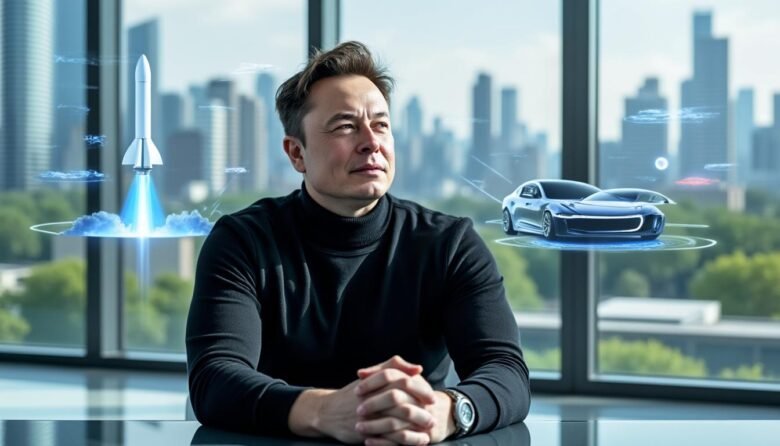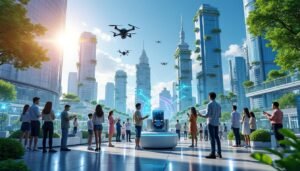En bref:
– Elon Musk’s IQ is widely debated, with estimates often landing in the high 150s, yet intelligence is far more than a single number.
– Across ventures such as Tesla, SpaceX, Neuralink, OpenAI, and The Boring Company, Musk demonstrates a pattern of problem-solving, first-principles thinking, and relentless work ethic that extends beyond conventional IQ tests.
– The most compelling portrait of his intelligence blends cognitive capacity with creativity, discipline, and strategic risk-taking—traits that inspire both admiration and scrutiny in equal measure.
– Historical comparisons to figures like Leonardo da Vinci and Albert Einstein remind us that high intelligence manifests in many forms, from visual-spatial mastery to theoretical insight, and that the true impact of intellect shows up in outcomes over time.
– As AI and automation accelerate, the measurement and meaning of intelligence will continue to evolve, reshaping how we evaluate visionaries and the kinds of minds society rewards.
Elon Musk IQ: What the Numbers Really Indicate for a Tech Visionary
The question of Elon Musk’s IQ has long fascinated analysts, fans, and competitors. While there is no official public score from a standardized test, there are widely circulated estimates that place his IQ in the high 150s to around 160. A figure such as 155 would place him in the top two percent of the population, according to conventional IQ distributions. Yet these numbers are best understood as rough signals rather than precise measurements. They do not capture the full spectrum of intelligence, nor do they account for how environments, training, and opportunity shape performance on specific tests.
IQ as a concept is designed to quantify certain cognitive abilities—logic, verbal reasoning, mathematical skill, pattern recognition, and some aspects of problem-solving. But real-world intelligence, especially for a figure like Musk, spans multiple dimensions: creative thinking, the ability to link disparate domains, a talent for simplifying complex problems via first principles, and a work ethic capable of sustaining discipline over years. In Musk’s case, the way he marshals resources, prioritizes high-leverage projects, and engineers systemic changes across large industries is as relevant to his reputation as any score on a test. For readers seeking to interpret Musk’s intellect in 2025, it helps to view IQ as one metric among many that describe a composite performance profile.
To contextualize the discussion, consider the arc of Musk’s career: co-founding Zip2, helping to power PayPal’s early growth, launching Tesla and SpaceX, and then steering ventures such as Neuralink, The Boring Company, SolarCity, and Starlink, while engaging with OpenAI and shaping the interface of consumer technology via X.com—a path that combines technical cognition with strategic foresight. These milestones illustrate more than any single IQ score: they reveal a mental architecture capable of long-range planning, cross-disciplinary synthesis, and persistent experimentation. Below is a compact view of the evidence, including caveats and context.
While some critics suggest that Musk’s achievements are amplified by resources and timing, proponents point to his instinct for leveraging AI and automation as a force multiplier that compounds intelligence with engineering discipline. Others emphasize the role of systematic thinking and the habit of breaking down problems into fundamental principles. The 2025 landscape makes these observations more salient, given the rapid pace of innovation across the companies Musk leads and invests in.
In the end, the best appreciation of Musk’s intellect comes from looking at outcomes, not just numbers. His impact on the automobile and aerospace industries, Internet infrastructure, and even biomedical interface research underscores how high cognitive ability, when coupled with strategic execution, can drive transformations that redefine entire sectors.—a reminder that intelligence is a living construct whose value is measured by the innovations it enables.
Table: Quick claims about Musk’s IQ and the associated caveats
| Claim | Estimated IQ (if any) | Notes |
|---|---|---|
| High-end estimate commonly cited in media | Around 155–160 | Indicative only; test context and sample vary |
| IQ as predictor of success | Not determinative | Creativity, work ethic, risk tolerance, and timing matter |
| Impact of IQ on entrepreneurship | Indirect influence | Better pattern recognition and problem-solving may help, but execution matters most |
- The limits of IQ tests in capturing real-world problem-solving across dynamic tech ecosystems
- How first-principles thinking translates into scalable engineering and product design
- Role of disciplined work ethic and iterative experimentation in sustaining ambitious projects
For readers exploring the question in a broader context, consider how AI milestones relate to human cognitive benchmarks and the evolving landscape of intelligence measurement. The conversation also touches on the relative value of raw IQ versus domain-specific expertise and the speed with which new technologies change the baseline for what is considered “smart.” As the field advances, the lens through which we view Musk’s cognitive footprint will continue to evolve.

How IQ is discussed in tech leadership
In practice, leadership in high-technology fields often fuses quantitative metrics with qualitative signals. For Musk, the ability to translate ideas into deliverables across hardware, software, and systems integration stands out. The following factors commonly accompany discussions of smart leadership in technology, beyond a raw IQ figure:
- Cross-domain synthesis: linking physics, software, materials science, and operations
- First-principles reasoning: constructing solutions from basic truths rather than conventional wisdom
- Strategic risk-taking: embracing long timelines and large capital requirements
- Resilience and focus: managing setbacks, delays, and complex supply chains
For those curious about the historical context of high intelligence, compare the debates around Einstein’s approach to AI and computation with Musk’s pragmatic orientation toward building scalable systems. These comparisons illuminate that intelligence is not a static trait but a living capability that expands with new tools, environments, and challenges.
Musk’s Intellectual Trajectory Across Tesla, SpaceX, Neuralink, and Beyond
Musk’s career is a study in how cognitive capabilities intersect with technical domains, corporate strategy, and long-term ambition. In Tesla and SpaceX, he has repeatedly demonstrated the capacity to redefine physical constraints—battery technology, launch physics, propulsion reliability, and manufacturing throughput. In Neuralink and OpenAI, the focus shifts toward augmenting cognition and expanding the frontiers of artificial intelligence in alignment with human needs. The Boring Company and Starlink further extend the infrastructure layer—turning ambitious engineering into scaled, real-world capabilities. The pattern across these ventures reveals a cognitive profile that combines conceptual clarity with a ruthless drive to test ideas in the real world. The following sections map some core dimensions of this trajectory, linking them to tangible outcomes and lessons for anyone evaluating intelligence in high-impact tech leadership.
- Systems thinking: aligning hardware, software, supply chains, and regulatory environments
- Risk management at scale: balancing technological ambition with production realities
- Iterative validation: rapid prototyping, testing, and learning from failures
| Company/Project | Domain | Cognitive Skill Highlighted | Notable Outcome |
|---|---|---|---|
| Tesla | Automotive & Energy | Industrial engineering, systems integration | Battery performance breakthroughs; mass-market EV adoption |
| SpaceX | Spaceflight | Propulsion innovation, risk assessment | Reusable rockets; cost per kilogram reductions |
| Neuralink | Neurotechnology | Neurological interfaces, biomedical engineering | Early interfaces exploring brain-computer communication |
| OpenAI | Artificial Intelligence | Algorithmic design, safety & ethics alignment | Progress toward more capable AI with careful governance |
As we move through 2025, these cross-domain achievements illustrate a pattern: high-level cognitive ability combined with disciplined execution can turn ambitious ideas into tangible technologies that reshape entire industries. Readers who track AI governance and limitations will recognize how the strategic dimension of Musk’s decisions complements his technical acumen. The synergy between intellect and action is a recurring theme in his career narrative.
In addition to the above, the way Musk orchestrates collaborations, hires specialized talent, and builds ecosystems around each venture reveals a social dimension to intelligence. He understands where to push boundaries and where to rely on others to fill gaps. This dynamic, in turn, amplifies his perceived intelligence because the outcomes reflect both cognitive capacity and a talent for assembling teams that can execute high-ambition plans. For readers who want to explore the broader discourse on how intelligence translates into technological leadership, see the discussion on AI’s expanding role in society and how early pioneers across industries navigated similar crossroads.
Beyond IQ: Creativity, Problem-Solving, and the Work Ethic That Moves Giants
Intelligence is never a single linear measure; it expresses itself through creativity, methodological thinking, and endurance. Musk’s distinctive approach can be summarized in a few core traits that consistently surface in interviews, company histories, and public demonstrations. First-principles thinking—reducing problems to fundamental truths and building up from there—has become a signature method. This approach enabled him to question the status quo of automotive engineering, propulsion systems, and renewable energy storage, leading to breakthroughs that would seem improbable using conventional wisdom alone. The practice of breaking down monolithic problems into digestible parts makes it possible to conceive novel solutions that others might overlook.
Second, the willingness to tackle multi-domain challenges stands out. It is not enough to excel in software or hardware; Musk repeatedly marries software engineering with mechanical design, materials science, and logistics. This cross-pollination is visible in the way he integrates Starlink satellite connectivity with consumer devices, or how battery packs designed for Tesla vehicles feed into energy storage systems for SolarCity, enabling a broader energy ecosystem. The ability to think across disciplines and translate ideas into scalable platforms is a cognitive depth that complements raw testing speed and calculation power.
Third, the tempo of experimentation—rapid prototyping, learning from failures, and iterating quickly—defines a culture where high standards coexist with high risk tolerance. In the early days of Zip2 and later PayPal, that mindset differentiated a young entrepreneur from many of his peers. The same tempo appears in rocket development with SpaceX, where quick iterations, failure analysis, and disciplined redesigns culminated in reliability improvements with each launch cadence. The net effect is a creative energy that translates tentative ideas into proven capabilities, a hallmark of a person whose cognitive profile blends analytic rigor with imaginative foresight.
- Creative pattern recognition: spotting connections between disparate domains
- Operational imagination: envisioning scalable systems rather than isolated innovations
- Stoic resilience: maintaining focus through setbacks and delays
| Trait | What it enables | Observation in Musk’s work |
|---|---|---|
| First-principles thinking | Reduces problems to basics; rebuilds from ground up | Reimagined battery chemistry; reusability in rocketry |
| Cross-domain synthesis | Bridges engineering, software, and business strategy | Integrates Starlink with consumer tech; aligns energy with mobility |
| Iterative experimentation | Accelerates learning; lowers risk per iteration | Frequent redesigns in rockets and car platforms |
Intellect themed around 2025 acknowledges that intelligence must be exercised within an ecosystem. The repeated pattern of ideation, rigorous testing, refinement, and scale-up is a practical demonstration of cognitive depth. The dynamic relationship between thought and action in Musk’s career also hints at why his ventures attract both admiration and critical scrutiny. Critics argue that high IQ alone cannot guarantee success; supporters argue that the fusion of intellect with systemic execution creates a unique catalyst for change. The public conversation thus evolves into a broader inquiry: what is the true currency of innovation in an era of accelerating technology?
Readers seeking diverse perspectives on the human capacity for innovation can explore analyses such as the balance of human wit and machine reasoning and the timeline toward artificial general intelligence. These discussions enrich the understanding of how a technologist like Musk navigates a landscape where creativity, reliability, and speed of execution carry as much weight as formal IQ numbers.
As a closing thought for this section, consider that the most striking systems come from blending cognitive discipline with bold experimentation. Musk’s pattern—solve the hardest physics problems, then build the most practical, scalable product—offers a compelling blueprint for analyzing genius in the modern tech era.

Key factors behind Musk’s creative output
The following list highlights components beyond traditional IQ that fuel his work:
- Deep-rooted curiosity about how things work at a fundamental level
- Relentless focus on high-impact problems
- Ability to translate abstract concepts into tangible products
- Strategic decision-making about which projects to pursue and scale
| Factor | Impact on outcomes | Examples |
|---|---|---|
| Fundamental understanding | Better problem framing | Rockets, battery tech, propulsion |
| Project selection | Focus on high-leverage opportunities | Starlink, Tesla energy ecosystem |
| Execution discipline | Translates ideas into scalable platforms | Mass production, supply chain optimization |
IQ Debates: Historical Geniuses and the Limits of IQ as a Metric
IQ tests emerged in the early 20th century as attempts to quantify cognitive capacities that predict learning and problem-solving. Over time, civilizations have repeatedly revisited the idea of “the smartest person in history,” with names like Leonardo da Vinci, Albert Einstein, and Paul Dirac entering the discourse. Each of these figures represented a distinct mode of intelligence: Leonardo’s cross-disciplinary artistry and anatomical insight; Einstein’s theoretical breakthroughs in relativity and thought experiments; Dirac’s mathematical elegance and quantum field insights. Today, the challenge remains: how do we compare minds that function in fundamentally different domains, under different historical conditions, with different kinds of data to hand?
What makes Elon Musk’s intelligence distinctive within this spectrum is not simply a high IQ estimate, but a combination of problem-solving agility, domain integration, risk-bearing leadership, and a capacity to convert abstract reasoning into scalable, real-world systems. Historical comparisons illuminate both the strengths and the limits of IQ as a stand-alone metric. For example, Dirac’s ability to anticipate mathematical structures without conventional derivations and Feynman’s knack for communicating complex physics through intuitive explanation highlight diverse manifestations of intellectual power. These figures underscore a broader truth: intelligence includes the ability to generate, test, and refine ideas that change how people live. Musk’s achievements—across vehicles, rockets, neurotechnology, and digital platforms—exemplify a modern interpretation of cognitive potential aligned with systemic execution.
Table below offers a concise snapshot of several historical figures widely discussed in relation to IQ and impact. It illustrates ranges and caveats around estimates, while acknowledging the distinct contributions each person made to science, art, and society. This framing helps to situate Musk within a long arc of human intellect where numbers are only part of the story.
| Figure | Estimated IQ (public discussion) | Main Contribution | Notes on Intelligence |
|---|---|---|---|
| Leonardo da Vinci | Not reliably quantified | Art, anatomy, engineering, invention | Cross-disciplinary genius; creativity as core driver |
| Albert Einstein | Speculated high IQ; not formally published | Theory of Relativity; quantum foundations | Abstract reasoning with deep conceptual insight |
| Paul Dirac | Estimates vary; high | Foundations of quantum electrodynamics; mathematics | Pure mathematical elegance; rare cognitive style |
| Richard Feynman | Well above average; often cited | Quantum mechanics pedagogy; nanoscopic thinking | Humor and intuition in teaching complex ideas |
When considering the potential for AI to redefine intelligence, the debate stretches beyond human IQ. Some analysts argue that artificial systems may achieve unprecedented problem-solving complexity, potentially exceeding human benchmarks in certain domains. Others stress that common sense, ethical reasoning, and nuanced understanding of social contexts remain difficult for machines to master. The interplay between human cognitive diversity and machine capabilities is a central theme in 2025, as highlighted by ongoing discussions about AI constraints and safety and the quest for responsible AI frameworks.
| Metric | Human | AI |
|---|---|---|
| Pattern recognition | Highly flexible across contexts | Rapid in large data sets but sometimes lacking common sense |
| Abstraction | High in scientific thinkers | Incrementally improving with model design |
| Common sense | Built from lived experience | Often missing; improved with training data and alignment |
For readers who want broader context on intelligence discourse, consider the evolving landscape of artificial intelligence and comprehension and milestones in AI evolution. These sources help illuminate how the measurement of intelligence is shifting as technology becomes more capable and embedded in daily life.
The Future of Intelligence: AI, Innovation, and Musk’s Expanding Influence
The trajectory of intelligence research and technology governance will shape how we value innovators like Musk in the coming years. If artificial intelligence continues to mature toward more generalized capabilities, the emphasis may shift from human IQ alone to an integrated view that includes collaborative problem-solving between humans and machines. Musk’s ongoing engagement with AI, space exploration, and human-machine interfaces—through ventures like OpenAI collaborations, Neuralink development, and satellite networks via Starlink—places him at a crossroads where cognitive capacity, ethical considerations, and scalable impact intersect. In this sense, the 2025 context reinforces that intelligence is relational: it grows stronger when paired with the right institutional and technical ecosystems.
- AI safety and alignment as a core priority in high-stakes innovation
- Human-centric design principles guiding neural interfaces and automation
- Global infrastructure improvements enabled by satellite networks and energy solutions
| Domain | Impact on the World | Musk’s Role |
|---|---|---|
| AI governance | Shaping policy and safety standards | Active participant and investor in AI safety debates |
| Space infrastructure | New frontiers in communication and transport | Driver of reusable launch systems and cost reductions |
| Neural interfaces | Potential human augmentation | Advancing brain-computer integration research |
To explore related themes, readers can consult resources on humor and cognition in AI debates and historical perspectives on AI through Einstein’s lens. These perspectives help frame a forward-looking discussion about how intelligence is imagined, measured, and applied in a rapidly changing digital and physical world.
Challenging the narrative: what truly defines genius in 2025
In practice, a robust definition of genius today blends cognitive breadth with the capacity to operationalize ideas at scale. Musk’s public persona as a relentless executor compounds his IQ signals with tangible results across multiple industries. The analysis of his intelligence, then, becomes a dialog between numerical indicators, creative capacity, and the societal value of assembled systems. As AI becomes more integrated into every facet of work and life, the metrics we rely on will likely expand to capture collaboration, safety, and ethical stewardship as well as raw problem-solving ability.
Readers who want to dig deeper into Musk’s broader ecosystem can explore additional case studies on the limits and constraints of AI and the role of AI in daily life.
In sum, while a number like 155–160 can be a helpful shorthand for a high cognitive capacity, it is the synthesis of intellect, creativity, execution, and leadership that truly defines the impact of a figure like Elon Musk in 2025. That synthesis, rather than a single score, remains the most meaningful measure of his influence on Tesla, SpaceX, Neuralink, OpenAI, The Boring Company, SolarCity, Zip2, PayPal, Starlink, and X.com.
End section note: the interplay between high-level intellect and real-world results continues to shape how the world perceives the genius of visionary technologists in the mid-2020s. The conversation is far from settled, and new milestones will keep informing the narrative of what it means to be “smart” in the modern age.
FAQ
What is the typical range of Elon Musk’s estimated IQ, and how reliable is it?
Public discussions often place Musk’s IQ around 155–160, but these estimates are informal and depend on the test, sample, and context. They are best seen as rough signals rather than definitive measurements.
How does Musk’s intelligence translate into real-world outcomes across his companies?
IQ is only one piece of the puzzle. Musk’s strength lies in first-principles thinking, cross-domain integration, and a strong execution discipline that turns ideas into scalable products and infrastructure.
Why do historians compare Musk with figures like Leonardo da Vinci or Einstein?
Historical comparisons highlight the diversity of intelligent expression—from visual-spatial creativity to theoretical insight. They remind us that high intelligence can manifest in multiple modes, not just through a single numerical score.
Will AI redefine how we measure intelligence in the future?
As AI advances, assessments may incorporate collaborative problem-solving, ethical reasoning, and human-in-the-loop capabilities, expanding beyond traditional IQ tests to capture a broader picture of intelligence.




